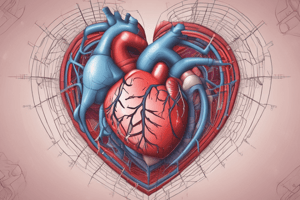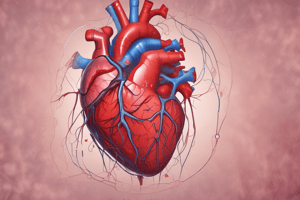Podcast
Questions and Answers
Which of the following is a primary cause of heart failure?
Which of the following is a primary cause of heart failure?
- Inversion of heart chambers
- Excessive exercise
- Increased cardiac output
- Cardiac arrhythmias (correct)
What symptom is most likely to occur in left-sided heart failure?
What symptom is most likely to occur in left-sided heart failure?
- Distended neck veins
- Proximal nocturnal dyspnea (correct)
- Peripheral edema
- Chest pain
Which treatment is considered a last resort for heart failure?
Which treatment is considered a last resort for heart failure?
- Medication adjustment
- Surgical intervention
- Heart transplantation (correct)
- Lifestyle modifications
What dietary change is recommended for managing heart failure?
What dietary change is recommended for managing heart failure?
Which of the following is a sign of right-sided heart failure?
Which of the following is a sign of right-sided heart failure?
What lifestyle change is recommended for patients with heart failure regarding exercise?
What lifestyle change is recommended for patients with heart failure regarding exercise?
Which of the following is NOT a common symptom of left-sided heart failure?
Which of the following is NOT a common symptom of left-sided heart failure?
What is a common indication of fluid retention in right-sided heart failure?
What is a common indication of fluid retention in right-sided heart failure?
Which of the following can potentially affect the contractility of the myocardium?
Which of the following can potentially affect the contractility of the myocardium?
What is recommended to achieve weight control for heart failure patients?
What is recommended to achieve weight control for heart failure patients?
What is the primary function of diuretics in patients with heart failure?
What is the primary function of diuretics in patients with heart failure?
Which medication type is specifically used to strengthen the pumping ability of the heart?
Which medication type is specifically used to strengthen the pumping ability of the heart?
What is an important nursing action when administering diuretics?
What is an important nursing action when administering diuretics?
What should be positioned higher to aid patients with heart failure?
What should be positioned higher to aid patients with heart failure?
In the acute stage of heart failure, what is a recommended patient care action?
In the acute stage of heart failure, what is a recommended patient care action?
What type of exercises are suggested for heart failure patients every 1 to 2 hours?
What type of exercises are suggested for heart failure patients every 1 to 2 hours?
Which of the following should be monitored to avoid respiratory distress in heart failure patients?
Which of the following should be monitored to avoid respiratory distress in heart failure patients?
Which nursing action is essential to ensure compliance with treatment in heart failure patients?
Which nursing action is essential to ensure compliance with treatment in heart failure patients?
Why is sodium restriction important for heart failure patients?
Why is sodium restriction important for heart failure patients?
What should nursing staff monitor in heart failure patients regarding medication adherence?
What should nursing staff monitor in heart failure patients regarding medication adherence?
Flashcards
What is heart failure?
What is heart failure?
The heart's inability to pump enough oxygen-rich blood to meet the body's needs.
What is one main cause of heart failure?
What is one main cause of heart failure?
Structural problems like faulty heart valves or holes between heart chambers.
What is another main cause of heart failure?
What is another main cause of heart failure?
The heart muscle's weakness, like in cardiomyopathy or coronary artery disease.
What is a third main cause of heart failure?
What is a third main cause of heart failure?
Signup and view all the flashcards
What is right-sided heart failure?
What is right-sided heart failure?
Signup and view all the flashcards
What is left-sided heart failure?
What is left-sided heart failure?
Signup and view all the flashcards
What is a sign of right-sided heart failure?
What is a sign of right-sided heart failure?
Signup and view all the flashcards
What is a sign of left-sided heart failure?
What is a sign of left-sided heart failure?
Signup and view all the flashcards
What is dietary modification for heart failure?
What is dietary modification for heart failure?
Signup and view all the flashcards
What is exercise for heart failure?
What is exercise for heart failure?
Signup and view all the flashcards
Diuretics
Diuretics
Signup and view all the flashcards
Digitalis
Digitalis
Signup and view all the flashcards
Vasodilators
Vasodilators
Signup and view all the flashcards
Angiotensin-converting enzyme (ACE) inhibitors
Angiotensin-converting enzyme (ACE) inhibitors
Signup and view all the flashcards
Calcium channel blockers
Calcium channel blockers
Signup and view all the flashcards
Daily weight
Daily weight
Signup and view all the flashcards
ABG (Arterial Blood Gas) values
ABG (Arterial Blood Gas) values
Signup and view all the flashcards
Deep breathing exercises
Deep breathing exercises
Signup and view all the flashcards
Passive range of motion exercises
Passive range of motion exercises
Signup and view all the flashcards
Sodium restriction
Sodium restriction
Signup and view all the flashcards
Study Notes
Heart Failure Definition and Causes
- Heart failure is a clinical condition where the heart cannot pump enough oxygenated blood to meet the body's needs.
- Causes include structural abnormalities (e.g., valve malfunction, abnormal communication between heart chambers), inadequate myocardial contractility (e.g., cardiomyopathy, coronary artery disease), and cardiac arrhythmias.
Types of Heart Failure
- Heart failure is categorized into right-sided and left-sided heart failure.
Right-Sided Heart Failure Signs and Symptoms
- Distended neck veins with elevated pressure and congestion in systemic veins.
- Peripheral edema (swelling) and weight gain.
- Liver congestion and ascites (fluid buildup in the abdominal cavity).
- Anorexia (loss of appetite) and nausea due to gastrointestinal tract swelling.
- Nocturia (increased urination at night).
Left-Sided Heart Failure Signs and Symptoms
- Paroxysmal nocturnal dyspnea (shortness of breath after sleeping).
- Frequent coughing, particularly when lying down, and shortness of breath (orthopnea) due to pulmonary edema.
- Fatigue and decreased exercise tolerance.
- Pale, cold, clammy skin.
- Dizziness or fainting.
- Sudden death.
Treatment Options
- Lifestyle changes (crucial for symptom management).
- Medications (various types).
- Surgery to correct heart or valve abnormalities.
- Heart transplantation (a last resort).
Lifestyle Changes for Heart Failure
- Dietary modifications: salt-restricted diet, reduced fat intake (especially animal fat), controlled fluid intake, weight management (caloric reduction), and frequent small meals instead of large ones.
- Rest and exercise: individualized exercise programs after physician evaluation, alternating rest periods and activity, gradual increase in activity levels, and tailored exercises (e.g., walking, bicycling, swimming).
- Smoking cessation and avoidance of alcohol.
Medications for Heart Failure
- Diuretics: increase urination to remove excess salt and water, but electrolyte monitoring is vital.
- Digitalis: strengthens the heart's pumping ability.
- Vasodilators, ACE inhibitors, and calcium channel blockers: lower blood pressure to reduce strain on the heart.
Nursing Roles in Heart Failure Care
- Positioning the patient comfortably.
- Bed rest and bedside commode in acute stages.
- Elevating the head of the bed.
- Monitoring vital signs, daily weight, and administering medications.
- Assessing respiratory distress and ABGs (arterial blood gases).
- Providing pulmonary hygiene.
- Administering supplemental oxygen as needed.
- Encouraging deep breathing exercises.
- Passive range-of-motion exercises.
- Administering sedation as prescribed.
- Restricting sodium.
- Preventing constipation.
- Monitoring patient compliance with medications, diet, and lifestyle changes.
- Educating patients about their disease and treatment plan.
Studying That Suits You
Use AI to generate personalized quizzes and flashcards to suit your learning preferences.
Description
This quiz explores heart failure, including its definition, underlying causes, and different types. It covers signs and symptoms for both right-sided and left-sided heart failure. Test your knowledge on this critical cardiovascular condition.




